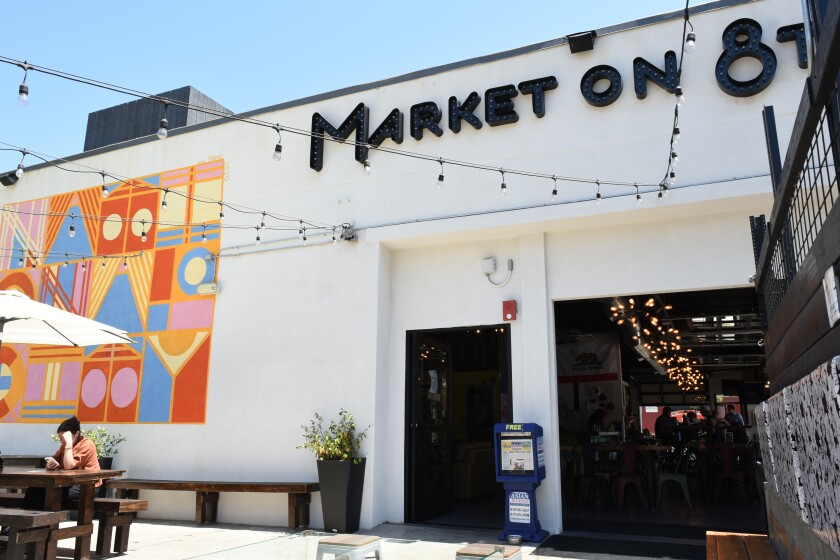The new food hall in downtown National City is lively any day of the week. People sip coffee in the morning while browsing their laptops, colleagues talk about their day over lunch, and families break bread at long wooden tables for dinner.
Market on 8 since opening late last yearth Transforming a once desolate corner into a community gathering space. The owners now want to enhance the experience with live entertainment and new alcohol sales.
Many residents are excited about the addition. Some worry that current challenges, such as finding street parking, will be exacerbated.
To make these business changes, Joel Tubao, who owns and operates the market with his family, asked the city for permission.
He received it last week when the city council unanimously backed his proposal with certain conditions. The council’s vote was held after he heard comments from about 30 public with varying opinions.
“[The market]as a whole is 8th street, for our downtown,” said Deputy Mayor Marcus Bush. “This space has really become a public gathering space and a community space.”
Council members have approved changes to the conditional license for business. This allows for live performances and extended hours of operation to sites located at 8.th Street and A Avenue.
With this change, the food hall now hosts live entertainment including bands, karaoke, and DJs daily from 8am to 1am, with craft beer and wine on sale until midnight. Prior to approval, the business could only have solo entertainers and sell beer from Novo Brasil, the only beer vendor in the food hall, until 10 p.m. You can also add a and allow alcohol to be consumed on the front patio.
Patrons are seated on the rear patio while others enjoy their meal indoors at the 8 Day Market in National City on Tuesday, Aug. 16, 2022.
(Tammy Marga/San Diego Union-Tribune)
Bill McCall said some residents are concerned that extended hours and take-out alcohol sales are a “recipe for trouble.”
Others were concerned about potential noise disturbances and drinking on the front patio. He said he had no plans to turn it into a place to “drink”.
“What we’re looking to do is add more value to the community. You can sit there and have a nice glass of wine or craft beer and enjoy the community,” he says, sometimes with a jazz band. He added that he envisions hosting , hosting yoga on the patio, and serving kombucha.
Dominique Hernandez, chef of one of the food hall’s 12 vendors, said providing a location for open mic nights strengthens the hall as a gathering space for people of diverse interests and backgrounds.
Alderman Ron Morrison made some suggestions, which other aldermen also approved. He asked that alcohol sales stop at midnight instead of 1 a.m., and that take-out beers be limited to four packs of he-16 oz cans.
One of the most pressing concerns for some residents, business owners and some lawmakers was parking. Since the market opened, street parking on A Avenue and the surrounding area has been difficult due to lack of parking at the food hall and several nearby establishments.
David Ramos, who lives on A Avenue near Food Hall, said he opposed the permit change.
“When I get home, the first thing I have to do is wait in front of my house to get a parking space, and so does my neighbor,” he said.
The market is not required to provide parking for customers, but Tubao said he is in talks with Southwestern College about allowing patrons to park in the parking facilities located at National City Boulevard and 8. rice field.th city.
Morrison emphasized that with longer opening hours and patrons staying longer on the premises, there needs to be more parking or better ways to circulate traffic. He suggested adding metered parking in the area. The city is currently drafting a parking management plan and a pilot program to add meters along several downtown streets.
President Bush said that wherever densities increase, such as downtown the city with several new small businesses and Parco, a 127-unit mixed-use residential and commercial building across the street from the food hall, “parking is It will definitely be a challenge,” he said.
Jose Rivas, who works at the market and lives on A Avenue, said recent growth in the neighborhood and food halls as anchors has brought life back to what was once a “ghost town.”


Commentaires
Enregistrer un commentaire